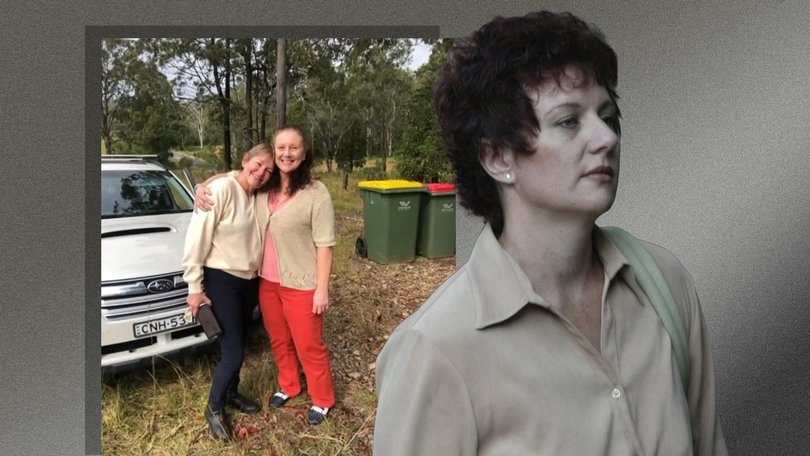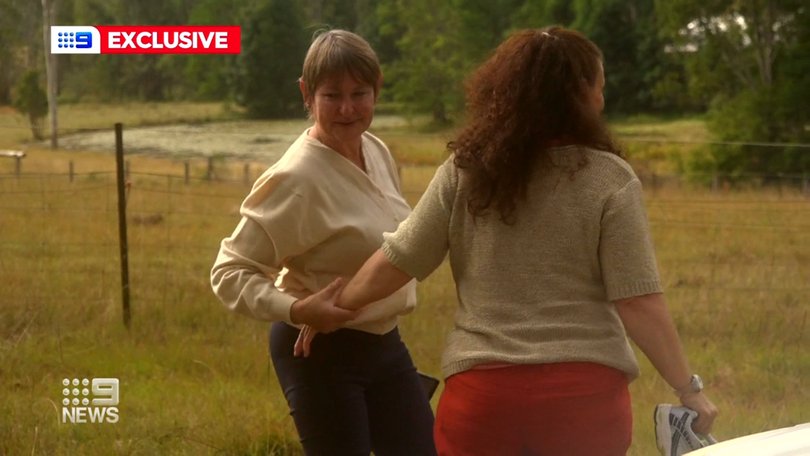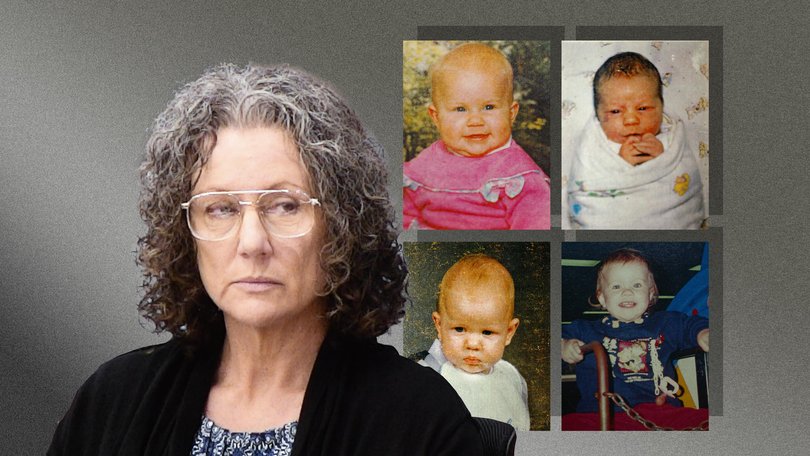Inside Out: Kathleen Folbigg’s memoir reveals family cruelty, betrayal and how she survived 20 years in prison
A cold husband, family betrayal, a cruel legal system, and 20 years of wrongful imprisonment: Kathleen Folbigg has survived them all. For the first time, a memoir shows just how.

In the wake of a devastating wrongful conviction for the killing of her four children, Kathleen Folbigg was called a monster.
Grief-stricken, alone and labelled the nation’s worst female serial killer after being found guilty for the deaths of Caleb, Patrick, Sarah and Laura Folbigg in 2003, she was bound to the stake in one of the most wide scale witch hunts in Australian history.
But Ms Folbigg was not a monster, she was a mother who had lost her children.
Sign up to The Nightly's newsletters.
Get the first look at the digital newspaper, curated daily stories and breaking headlines delivered to your inbox.
By continuing you agree to our Terms and Privacy Policy.A woman deserted and betrayed by loved ones when she needed them most.
Her true self, and a display of unwavering strength, is at the heart of her new book Inside Out co-written by friend and advocate Tracy Chapman.
The road to proving Ms Folbigg’s innocence lay outside prison walls, and came at a cost she could never afford on her own.
When her forty year sentence was handed down 22 years ago, it seemed there was no one to take up the fight.
But unbeknownst to her, a childhood friend had been watching from afar.
Convinced of Ms Folbigg’s innocence, Ms Chapman sent her a letter.
And so it began.
Timed six-minute phone calls and pages upon pages of heartfelt letters soon rekindled a fierce friendship that served as a lifeline through twenty years of wrongful imprisonment.
After years of persistent advocacy, it led to Ms Folbigg’s exoneration.
Now the pair have written a shared memoir, a re-humanisation of a woman once written off as evil as well as a harsh reprimand to a legal system that got it so wrong.
Jailed by prejudice
Attitudes of what a mother “should be” and how a mother “should act” were questioned by Ms Folbigg herself throughout a childhood in which she endured a strained relationship with her foster mum.
Her account details abuse and intolerance, but when she married Craig Folbigg, she was excited to have a baby - all she really wanted was to be a great mother.

Split narration between Ms Folbigg and Ms Chapman takes us across the harrowing moments that followed. It offers Ms Folbigg’s own perspective, and provides further depth in the perspectives of those watching her.
Bearing witness to another’s grief in this way is exceptionally powerful.
Ms Folbigg’s account of the deaths of Caleb, Patrick, Sarah and Laura is so devastating that it is impossible to reconcile the once-prevalent rhetoric that she was a “cold” woman.
However, that was the characterisation which was weaponised against her at the 2003 trial, and formed part of what Ms Chapman describes as the misogynistic and cultural biases inherent in the conviction against her friend.
The prosecution’s case hinged on painting Ms Folbigg as a cruel mother who had smothered her four children, aged between 19 days and 18 months across a 10-year period from 1989 to 1999.
The investigation was aided by Mr Folbigg, who gave police her private diaries. It was argued that she had confessed to the killings in her entries.
The cruelty of Ms Folbigg’s situation is laid bare in her writing. After Sarah died, she was taken by depression and began to over-eat constantly. Her description of this time is wholly immersive.
The then-couple grieved separately. Mr Folbigg was spending days at a time away from home.
When Ms Folbigg confronted him, he gave her a cruel ultimatum - that she either she do something about her weight, or he would never come home again.
Later came a second brutal familial betrayal when Ms Folbigg’s own sister testified against her, framing her as a harsh mother. This solidified a severance from her family when she needed them most.
The jury found her guilty of manslaughter for Caleb, and of murder for Patrick, Sarah and Laura. An appeal saw her sentence reduced to thirty years.
The dual perspective structure of the book is especially poignant during the account of Ms Folbigg’s time in prison. Ms Chapman’s life makes for a stark parallel to Ms Folbigg’s degradation behind bars.
That feeling of deep isolation, of being on edge at all hours, on guard against violence and horrific verbal abuse, is masterfully conveyed by Ms Folbigg.
Even the small mercies of visits from friends were book-ended by humiliating strip searches.
Her friendship with Ms Chapman, who loved her unconditionally, kept her afloat.
Though Ms Folbigg paid the full price of this injustice, Ms Chapman was a collateral victim, carrying the gruelling burden of continuous out-of-pocket advocacy.
This is a rare insight, and one which Ms Chapman shares with reverence and vulnerability.
It was her belief from the outset that Ms Folbigg’s personal diary entries were not admissions of guilt, but rather the writings of a woman trying to process extreme loss in a private and trusted place.
It took twenty years and two inquiries before the New South Wales justice system agreed.
Saved by science
After substantial advocacy, and a failed first inquiry, the global scientific community banded together to change the narrative.
Testing led by geneticist Carola Vinuesa, found that Sarah and Laura inherited a rare mutation in the CALM2 gene from Ms Folbigg which can cause cardiac disorders and sudden death in infants.
Patrick and Caleb carried variants in the BSN gene, which are linked to sudden-onset epilepsy in mice. Patrick had experienced epileptic seizures before he died.

Throughout the process, Mr Folbigg refused to aid in building a full picture of each child’s death by providing a sample of his DNA, ignoring pleas from Ms Chapman. His death in 2024 ruled this avenue out for good.
Despite this, there was a finding that the likelihood of Ms Folbigg’s children dying for genetic reasons was high.
The second inquiry, backed by science, finally found reasonable doubt in the conviction, and Ms Folbigg was pardoned and called a “loving and caring mother”.
That care speaks throughout the book, in both Ms Folbigg’s and Ms Chapman’s recollections of their childhood. Following her release, she remains a woman who loves and misses her children.
At Ms Folbigg’s later exoneration hearing, it was found that her diaries were not reliable admissions of guilt.
This was a truth Ms Chapman had known from the beginning.
Over the years of advocacy, Ms Chapman found her passion for social justice. Now she is calling for legal reform to ensure both parents are compelled to undergo genetic testing in cases like Ms Folbigg’s.
She calls for the creation of an independent criminal review body, to ensure a fair and quick judicial inquiry process.
She knows the legal system is an organ, one not immune to pathogens and rot.
At the time of writing the book, Ms Folbigg’s compensation sum of $2 million had not yet been announced.
Since then, the freed 58-year-old has described the amount as insulting.
It reflects the unflinching critique at the core of this human story.
An unacceptable systemic failure. One that will only be fixed by fierce advocacy.
Inside Out is available for purchase in-store and online, and as an eBook and audiobook at www.penguin.com.au
